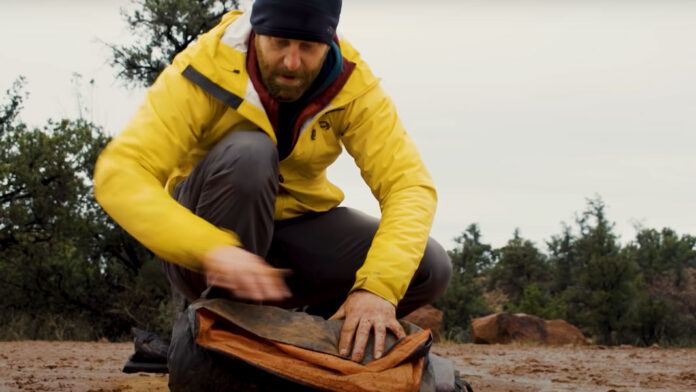Those rainy day blues keep far too many potential backpackers hunkered-down inside. And when those clouds roll in mid-hike, it's easy to be caught off-guard – especially if you were expecting sunny skies. In either case, knowing a few tricks of the trade to backpacking in the rain can help you to stay somewhat dry, reasonably comfortable, and most importantly, enthusiastic about taking on the outdoor world. Let's get into it.
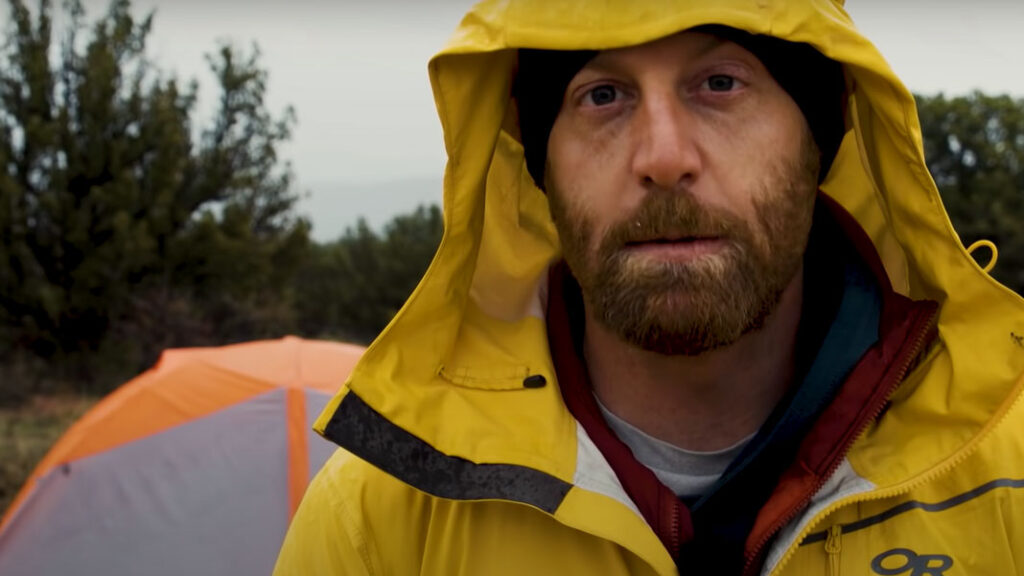
Motivating to hike and camp in the rain
Do people hike in the rain?
Hiking in the rain isn't all bad – far from it, actually. Since inclement weather keeps the crowds at bay, you may find yourself with a usually packed trail or campsite all to yourself. During the downpour, it can be a time of cozy introspection inside your tent. After all, nothing beats that soothing pitter-patter ambience.
Misty mountain views
When things clear up, the landscape can be quite spectacular. You may get some misty mountains in the background, and all over the rocks and vegetation will have that fresh glistening quality. Plus, if you hit the trails when others duck for cover, then you leave feeling like a total badass. So stride on you hardened adventurers!
Picking the Right Campsite
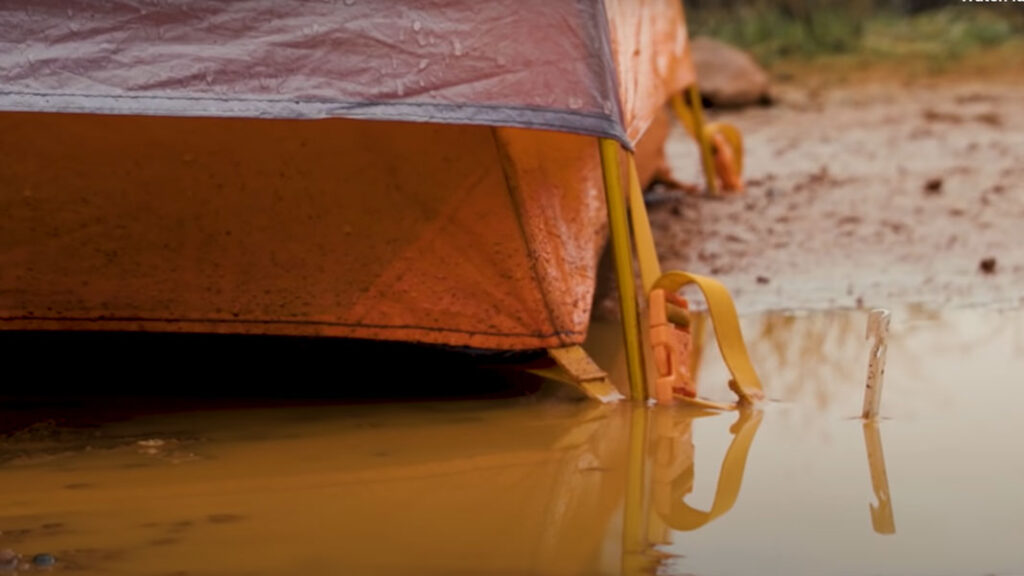
Tent set up in the rain
Camping in the rain is totally doable, but you'll want to be strategic about your tent site. When pitching your tent, try to find an area with a few degrees or slope, in order to encourage the water to shed away from your shelter.
Pooling water under the tent
There's nothing worse than waking up to a pool of water underneath your nylon floor. If water does start to accumulate in a particular spot, try digging a little trench with your boot to help it drain away.
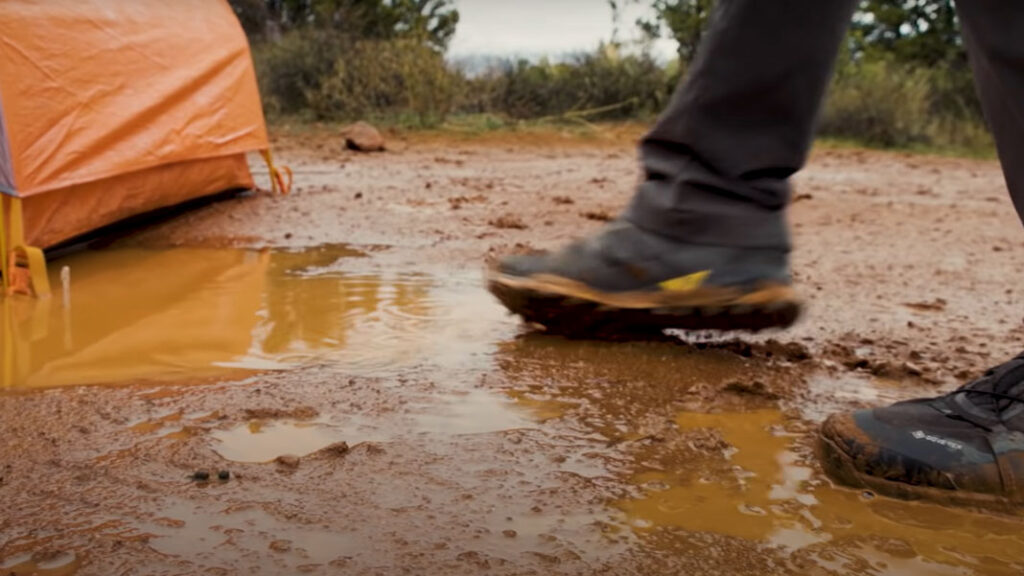
Tent tips during the rain
Now that you've selected a slightly sloping campsite, the next thing to pay attention to is the rain fly. This is obviously your best defense against the all-night drizzles, but you need to make sure it's pulled tight all the way around your shelter. Have a look for any additional tabs or hooks that you may not normally use, but will allow you to add even more tension.
Sagging rain fly from water
As the out layer of the tent gets drenched, eventually the water can cause it to sag. If that wet fly then makes contact with the tent wall, water will start to slip in. So stretch those pegs. Make sure the guy lines are stretched out to their max (don't worry, your tent is designed for this). This set-up will not only help you in the rain, but heavier winds too.
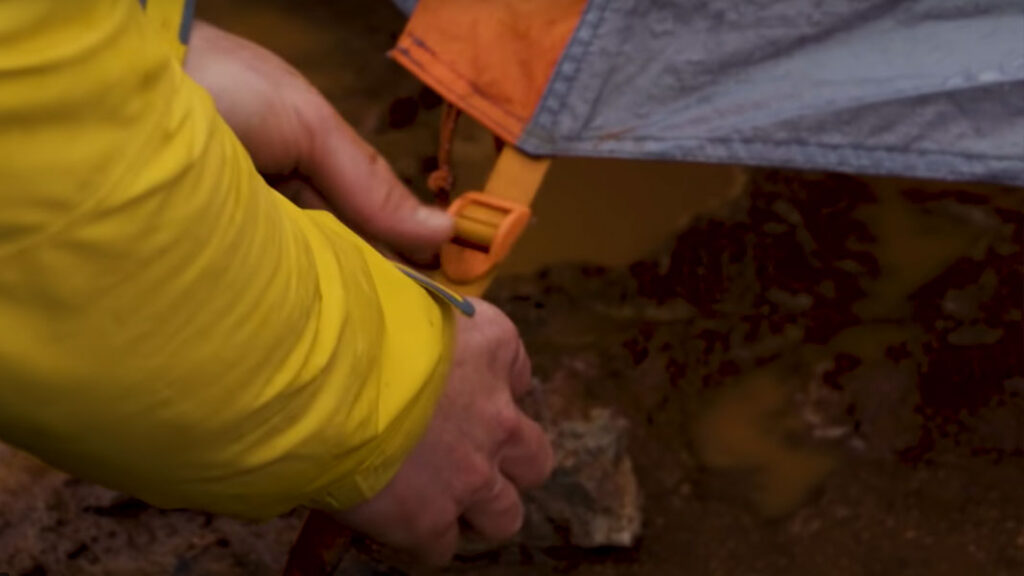
You must first get wet to stay dry
If you do spot anything sagging in the night, I encourage you to bite the bullet, get out, and readjust your setup. Even if you did everything right, things can still change with the conditions. For example, tent pegs like to migrate as the ground turns to mud.
Avoid touching the inside walls with gear
A similar principle applies from the inside out. Once you get settled in your tent, try to keep your gear from pressing up against the walls. This will also create contact with the drenched rain fly and eventually allow that pesky osmosis to take hold. Even waterproof fabrics have a point of saturation.
How do you keep mud out of a tent?
Another thing you'll find as the rains decide to linger is that the vestibule area of your tent can get pretty gross. Digging a trench or two will once again work to drain the excess water, but to help with the mud situation, try collecting dead branches, bunches of pine needles, or anything of that nature (pun intended) for a makeshift doormat.
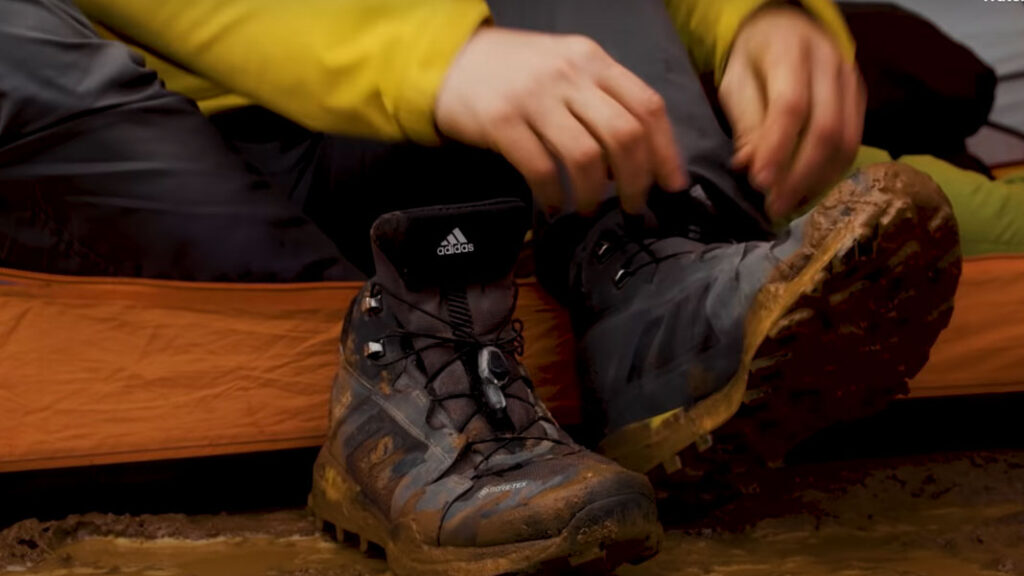
Now, you might normally store some of your gear in this transitional area, but if it's a soupy situation, then you're going to want to stuff your backpacks inside. This might mean a cramped sleeping environment, but it will reduce the overall mud exposure. The obvious exception here is mucky boots. Keep those suckers outside of your sanctuary.
Leave the boots outside in the vestibule
Personally, I'd rather wake up to damp boots (which is usually inevitable on rainy trips anyway) than a muddy tent. Maybe even pop a plastic grocery bag in your rucksack for just this occasion.
Tent setup during the rain
The tips so far have mostly pertained to a campsite that is set up in advance of any rain. But what about if you roll into camp and it's coming down hard? Unfortunately, until you get that rain fly on, your tent will inevitably get wet. Sure, try to break your own speed record, but don't cut corners making everything taut! When the deed is done, bust out a quick-dry towel, or even just a dank t-shirt and do your best to mop up all the water.
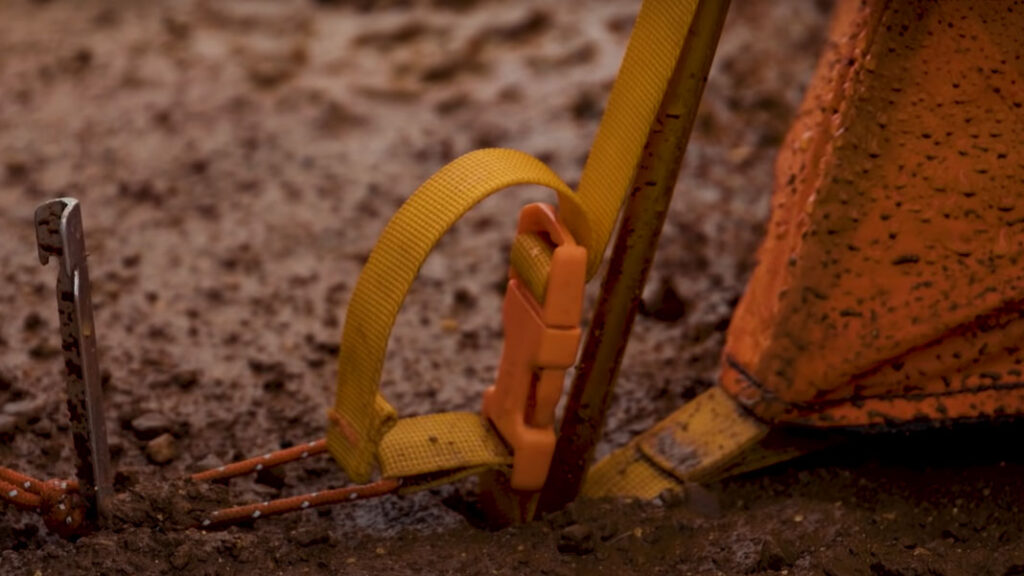
Take a quick look around to scout for the best tent site
Every once in a while you'll luck out with some tree cover within shouting distance of your site. So whenever possible, I'll set up the tent (as best I can) out of the pouring rain, and then walk it over and quickly stake it out/make minor adjustments. I know rain is a solid motivator to get hustling, but if you can take a beat to assess the area, you might be rewarded with a significantly drier shelter.
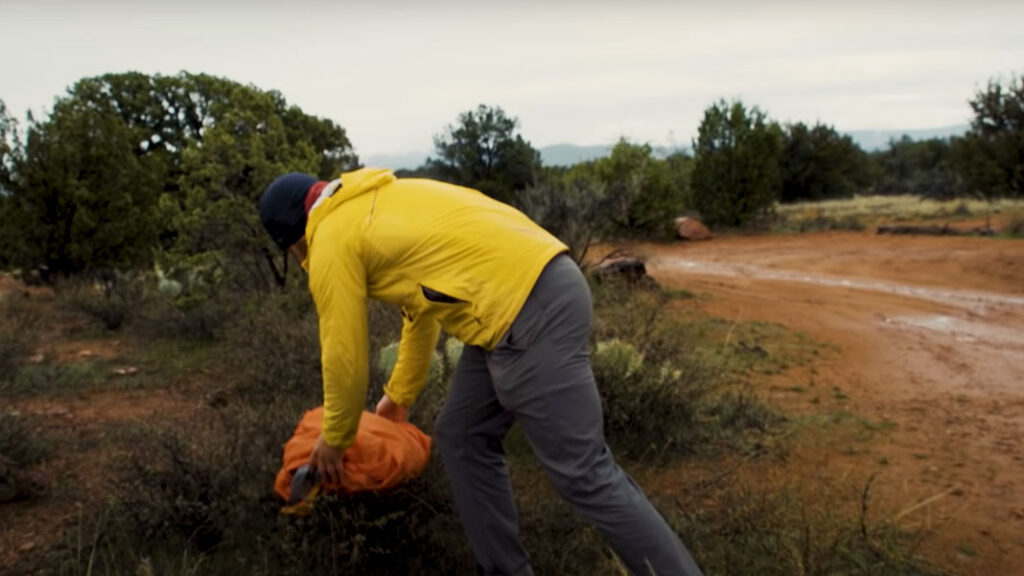
Pack a wet tent?
If you're doing a multi-day trip and you catch a bout of rain, then packing up a wet tent is just going to come with the territory. This is fine to do (though unpleasant, for sure) for short periods. All you can do is hope that your next campsite will bring sunnier tidings.
Dry it out when you get to camp
When you arrive, make set-up your first priority so that your tent has every available minute to dry out. And if you're heading home after an onslaught, then don't forget about your tent when you get there. Trust me, I know it's easy to dump your gear in the garage, jump in the shower, make some hot food, plump down on the couch, and completely neglect that mildew-accumulating shelter.
Get everything unpacked, laid out, hung up, and then treat yourself to a cozy day. Not only is mold a lame surprise down the line, but it can also damage your tent.
The Right Clothing for the Rain is Critical
It goes without saying (and yet I'll say it anyway…) that a quality rain jacket and pants are a must when backpacking in the rain. But any old hardshell pieces may not suffice.
Best fabric to wear in the rain?
Manufacturers will often give their apparel a waterproof rating, which will range from less than 5,000 millimeters to over 20,000. As the number goes up, so will the price (so be forewarned), but also the clothing's ability to stave off heavier rains. Hopefully you're able to wrangle up some highly-protective outer layers, and then make sure you're treating them properly in order to preserve that waterproofing goodness.
What should you not wear in the rain?
Once you have your rain suit dialed in, continue to be strategic with those middle and base layers. If you're out there long enough, eventually (one way or another), your other clothes are going to get a little wet. So aim for sporty, moisture wicking, technical fabrics.
Cotton is not good to wear in the rain
Cotton is not your friend. It readily soaks up water and then holds on to it. Unless you plan to use it as a rag, leave those cotton tees at home. That sweet down jacket you spent good money on should also take a seat on the bench during rainy adventures. It's great for keeping you warm, but not dry.
How do you dry clothes while camping in the rain?
When the rain just won't quit, it can be a real challenge to scrounge up dry clothes from one day to the next – and hanging stuff may seem utterly pointless. But don't forget that your body is a surprisingly efficient heater.
At night, I like to pop a few pieces in my sleeping bag, and while I'm hiking, I slip a pair of socks or some undies inside my jacket. I may also opt to wear a wet t-shirt while I'm on the move, so that I can change into a dry one, stuffed safely deep in my bag, when I get settled again.
Backpacking Tips and Newsletter
I hope you enjoyed these tips for thriving in the rain. Sure, stay dry when you can, but when you can't, get after it anyway! And for more backpacking content on the regular, be sure to sign up for the In4Adventure newsletter.



